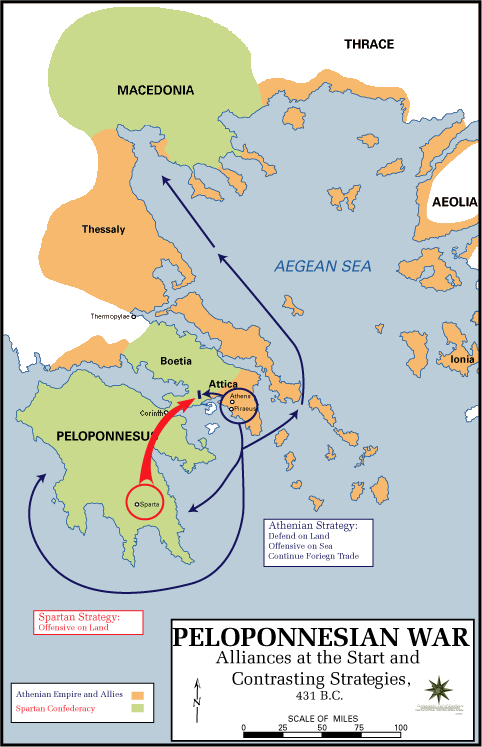Thanks to Dimitri Nakassis for sending me this passage
Thucydides. 7.27
“Thirteen hundred peltasts, Thracian swordsmen from the Dii tribe, also came to Athens the same summer. They were supposed to have traveled to Sicily with Demosthenes. Because they were rather late, the Athenians decided to send them back to Thrace where they came from. For it seemed too expense to retain them for the Decelean War since they each were earning a drachma a day.
Since Decelea was first invested by the whole enemy army in that summer and later was held by the garrisons coming from different cities coming in turn to ravage the land, it was causing great harm to the Athenians. Indeed, this undermined Athenian affairs first by loss of property and then by the death of men.
Previous attacks were brief and did not keep the Athenians from deriving benefit from their land the rest of the time. But once they were continually invested in Attica and they were sometimes attacking in force and at other times using a single garrison attacking the country and pillaging to supply itself. The Spartan king Agis was also present and he was no slacker in prosecuting the war.
The Athenians were greatly harmed; they were deprived of their whole land. More than twenty thousand slaves freed themselves and a great number of these were craftspeople. All of the sheep and pack animals perished. And the Athenian horses, because the cavalry was deploying every day to attack Decelea and guard the land, either went lame because of working on rocky ground or they were wounded.
ἀφίκοντο δὲ καὶ Θρᾳκῶν τῶν μαχαιροφόρων τοῦ Διακοῦ γένους ἐς τὰς Ἀθήνας πελτασταὶ ἐν τῷ αὐτῷ θέρει τούτῳ τριακόσιοι καὶ χίλιοι, οὓς ἔδει τῷ Δημοσθένει ἐς τὴν Σικελίαν ξυμπλεῖν. [2] οἱ δ᾽ Ἀθηναῖοι, ὡς ὕστεροι ἧκον, διενοοῦντο αὐτοὺς πάλιν ὅθεν ἦλθον ἐς Θρᾴκην ἀποπέμπειν. τὸ γὰρ ἔχειν πρὸς τὸν ἐκ τῆς Δεκελείας πόλεμον αὐτοὺς πολυτελὲς ἐφαίνετο: δραχμὴν γὰρ τῆς ἡμέρας ἕκαστος ἐλάμβανεν. [3] ἐπειδὴ γὰρ ἡ Δεκέλεια τὸ μὲν πρῶτον ὑπὸ πάσης τῆς στρατιᾶς ἐν τῷ θέρει τούτῳ τειχισθεῖσα, ὕστερον δὲ φρουραῖς ἀπὸ τῶν πόλεων κατὰ διαδοχὴν χρόνου ἐπιούσαις τῇ χώρᾳ ἐπῳκεῖτο, πολλὰ ἔβλαπτε τοὺς Ἀθηναίους, καὶ ἐν τοῖς πρῶτον χρημάτων τ᾽ ὀλέθρῳ καὶ ἀνθρώπων φθορᾷ ἐκάκωσε τὰ πράγματα. [4] πρότερον μὲν γὰρ βραχεῖαι γιγνόμεναι αἱ ἐσβολαὶ τὸν ἄλλον χρόνον τῆς γῆς ἀπολαύειν οὐκ ἐκώλυον: τότε δὲ ξυνεχῶς ἐπικαθημένων, καὶ ὁτὲ μὲν καὶ πλεόνων ἐπιόντων, ὁτὲ δ᾽ ἐξ ἀνάγκης τῆς ἴσης φρουρᾶς καταθεούσης τε τὴν χώραν καὶ λῃστείας ποιουμένης, βασιλέως τε παρόντος τοῦ τῶν Λακεδαιμονίων Ἄγιδος, ὃς οὐκ ἐκ παρέργου τὸν πόλεμον ἐποιεῖτο, μεγάλα οἱ Ἀθηναῖοι ἐβλάπτοντο. [5] τῆς τε γὰρ χώρας ἁπάσης ἐστέρηντο, καὶ ἀνδραπόδων πλέον ἢ δύο μυριάδες ηὐτομολήκεσαν, καὶ τούτων τὸ πολὺ μέρος χειροτέχναι, πρόβατά τε πάντα ἀπωλώλει καὶ ὑποζύγια: ἵπποι τε, ὁσημέραι ἐξελαυνόντων τῶν ἱππέων πρός τε τὴν Δεκέλειαν καταδρομὰς ποιουμένων καὶ κατὰ τὴν χώραν φυλασσόντων, οἱ μὲν ἀπεχωλοῦντο ἐν γῇ ἀποκρότῳ τε καὶ ξυνεχῶς ταλαιπωροῦντες, οἱ δ᾽ ἐτιτρώσκοντο.
It would be edifying to write a history of the Peloponnesian War from the perspective of the slaves on either side. At the very least, a selection of all the passages which mentioned slavery and enslaved peoples would change the way we think of the war.
Note from Charles F. Smith on perseus.edu
πλέον ἢ δύο μυριάδες : Boeckh, P. E. p. 55, reckons the number of slaves in Athens in the most flourishing period at 365,000, so that the number here given does not seem incredible.

